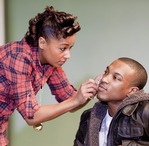SITE GUIDE
SEARCH
REVIEWS
REVIEW ARCHIVES
ADVERTISING AT CURTAINUP
FEATURES
NEWS
Etcetera and
Short Term Listings
LISTINGS
Broadway
Off-Broadway
NYC Restaurants
BOOKS and CDs
OTHER PLACES
Berkshires
London
California
New Jersey
DC
Connecticut
Philadelphia
Elsewhere
QUOTES
TKTS
PLAYWRIGHTS' ALBUMS
LETTERS TO EDITOR
FILM
LINKS
MISCELLANEOUS
Free Updates
Masthead
Writing for Us
A CurtainUp  London Review
London Review
 London Review
London ReviewOff The Endz
|
I worked my arse off at work. Came in early and left late and they never noticed. Not once. When the stock market crashed and all the banks were losing money — how many black faces did you see on TV? How many of our stories did they show? — Kojo
|

Lorraine Burroughs as Sharon and Ashley Walters as David (Johan Persson) |
Set among a group of young black 20 somethings who grew up on a London estate (the eponymous "Endz"), the play depicts characters who have lived through a dangerous upbringing surrounded by crime, looking to the future and trying to escape their past. In many ways, their issues are universal as they try to get established economically, afford a mortgage and provide a good life for their children, with the proviso that it is more difficult if you are black.
When the play opens, Sharon and Kojo are both working: Sharon (Lorraine Burroughs) as a nurse and Kojo (Daniel Francis) in a business job which he got after working as an intern. Sharon is also expecting their first child. The applecart is upset by the arrival of Sharon's ex-boyfriend, and Kojo's school friend, David (Ashley Walters). Newly released from prison and not prepared to work in minimum wage jobs, David instead opts for a get rich quick scheme which might not be entirely legal.
David is a forceful character with some of the script's very best lines and brilliantly played by the charismatic Ashley Walters. His non-compromising stand against authority is wonderful from the first row he has with Keisha, the uppity receptionist at Kojo's workplace (Madeline Appiah). Their standoff, which has Keisha head jabbing like a turkey, sees David's aggression and rudeness. We expect him to have a similar scene at the Jobcentre but there the older woman Marsha (Natasha Williams) handles him better and he is charming. We know he's a bad boy but we still love him.
However he does come between Sharon and Kojo, in a traditional triangular conflict of two against one at any point in time. The pairing shifts but it's often Sharon fighting with Kojo about David. David is an infuriating and inconsiderate house guest and some of his more outrageous statements draw shocked intakes of breath from the audience. Kojo has trouble keeping a grip on Sharon's spending and, although she uncompromisingly wants a lawful existence, she also has a consumer appetite for fashion, good furniture and expensive TV cable packages. With eight credit cards and four store cards, the couple are getting into debt but Kojo can't broach the subject with his pregnant wife. David offers Kojo a way out of these financial problems and together they run up against the gang of impossibly young kids whose territory is the Endz. These small chilling hoodies are really scary.
Lorraine Burroughs and Daniel Francis are convincing and attractive as the upwardly mobile pair. Jeremy Herrin's direction is tight and the performances are of the very best. The quick dialogue has a natural pace and sound that is thrilling. I very much liked Ultz's design, plain cream walls for Kojo's flat and shutters but which, when lit with ultra violet light, exposes the graffiti and decay of the estate in acid greens. Jo Joelson's stylish lighting also gives us exciting memorable visuals, dramatic images of figures silhouetted in black against a wall of fluorescent turquoise and green.
What elevates Bola Agbaje's writing is the compassion with which she draws even morally questionable characters, as well as the fresh, dynamic energy of the dialogue. With nuanced insight, she depicts the influence of a past they want to leave behind but are also drawn to: the nostalgia and friendship, not to mention the potential profit. Bola Agbaje's play about the clash of values and the reality of gang culture hits home with a powerful smack.
|
Subscribe to our FREE email updates with a note from editor Elyse Sommer about additions to the website -- with main page hot links to the latest features posted at our numerous locations. To subscribe,
E-mail: esommer@curtainup.comesommer@curtainup.com
put SUBSCRIBE CURTAINUP EMAIL UPDATE in the subject line and your full name and email address in the body of the message -- if you can spare a minute, tell us how you came to CurtainUp and from what part of the country. |
| Off The Endz
Written by Bola Agbaje Directed by Jeremy Herrin Starring: Lorraine Burroughs, Ashley Walters, Daniel Francis With: Madeline Appiah, Natasha Williams, Brandon Benoit-Joyce, Omar Brown, Thomas Eghator, René Gray Design: Ultz Lighting: Jo Joelson Music: Stephen Warbeck Sound: Emma Laxton Composer: Sophie Solomon Fight Director: Kate Waters Running time: One hour 25 minutes without an interval Box Office: 020 7565 5000 Booking to 13th March 2010 Reviewed by Lizzie Loveridge based on 19th February 2010 performance at the Jerwood Theatre Downstairs, Royal Court, Sloane Square, London SW1W 8AS (Tube: Sloane Square) |
|
REVIEW FEEDBACK Highlight one of the responses below and click "copy" or"CTRL+C"
Paste the highlighted text into the subject line (CTRL+ V): Feel free to add detailed comments in the body of the email . . . also the names and emails of any friends to whom you'd like us to forward a copy of this review. |
|
London Theatre Tickets Lion King Tickets Billy Elliot Tickets Mighty Boosh Tickets Mamma Mia Tickets We Will Rock You Tickets Theatre Tickets |




